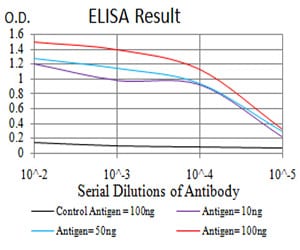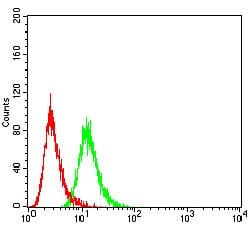


| WB | 咨询技术 | Human,Mouse,Rat |
| IF | 咨询技术 | Human,Mouse,Rat |
| IHC | 咨询技术 | Human,Mouse,Rat |
| ICC | 技术咨询 | Human,Mouse,Rat |
| FCM | 1/200 - 1/400 | Human,Mouse,Rat |
| Elisa | 1/10000 | Human,Mouse,Rat |
| Aliases | SIR2L3 |
| Entrez GeneID | 23410 |
| clone | 6B2A1 |
| WB Predicted band size | 43.6kDa |
| Host/Isotype | Mouse IgG1 |
| Antibody Type | Primary antibody |
| Storage | Store at 4°C short term. Aliquot and store at -20°C long term. Avoid freeze/thaw cycles. |
| Species Reactivity | Human |
| Immunogen | Purified recombinant fragment of human SIRT3 (AA: 155-290) expressed in E. Coli. |
| Formulation | Purified antibody in PBS with 0.05% sodium azide |
+ +
1. **文献名称**:*SIRT3 Is a Mitochondrial-Localized Tumor Suppressor Required for Maintenance of Mitochondrial Integrity and Metabolism during Stress*
**作者**:Kim HS 等
**摘要**:该研究通过Western blot和免疫荧光技术验证SIRT3抗体特异性,发现SIRT3通过去乙酰化作用调控线粒体代谢酶活性,参与细胞应激反应和肿瘤抑制功能。
2. **文献名称**:*SIRT3 Deficiency Increases Mitochondrial Oxidative Stress and Aggravates Renal Ischemia-Reperfusion Injury*
**作者**:Morigi M 等
**摘要**:研究使用特异性SIRT3抗体检测小鼠肾脏组织中的SIRT3表达,发现SIRT3缺失导致线粒体氧化应激加剧,加重肾缺血再灌注损伤,提示其保护作用。
3. **文献名称**:*SIRT3 Regulates Mitochondrial Fatty-Acid Oxidation via Reversible Enzyme Deacetylation*
**作者**:Hirschey MD 等
**摘要**:通过免疫沉淀和质谱分析,验证SIRT3抗体用于检测脂肪酸氧化相关酶的去乙酰化修饰,揭示SIRT3通过动态调控乙酰化水平维持能量代谢稳态。
4. **文献名称**:*Tissue-Specific Regulation of SIRT3 by Caloric Restriction and Its Impact on Mitochondrial Function*
**作者**:Lombard DB 等
**摘要**:研究利用SIRT3抗体分析不同组织中的SIRT3表达,发现热量限制通过上调SIRT3增强线粒体抗氧化能力,延缓衰老相关功能衰退。
SIRT3 (sirtuin 3) is a NAD⁺-dependent deacetylase primarily localized in mitochondria, playing a critical role in regulating energy metabolism, oxidative stress response, and mitochondrial homeostasis. As a member of the sirtuin family, SIRT3 modulates the acetylation status of various mitochondrial proteins, influencing pathways such as fatty acid oxidation, the tricarboxylic acid (TCA) cycle, and antioxidant defense systems. Its involvement in aging, metabolic disorders, and age-related diseases has made it a key focus in biomedical research.
SIRT3 antibodies are essential tools for studying the expression, localization, and function of this enzyme in cells and tissues. These antibodies are widely used in techniques like Western blotting, immunohistochemistry (IHC), immunofluorescence (IF), and immunoprecipitation (IP) to detect SIRT3 levels or assess post-translational modifications. Specificity and validation are crucial, as cross-reactivity with other sirtuin family members (e.g., SIRT1. SIRT2) may occur depending on the antibody’s epitope. High-quality SIRT3 antibodies are often validated using knockout cell lines or tissues to confirm target specificity.
Research applications of SIRT3 antibodies span cancer, neurodegenerative diseases, cardiovascular disorders, and metabolic syndromes, where mitochondrial dysfunction is implicated. Commercial SIRT3 antibodies vary in host species (e.g., rabbit, mouse), clonality (monoclonal/polyclonal), and reactivity across human, mouse, or rat samples. Proper antibody selection ensures reliable data in exploring SIRT3’s therapeutic potential or mechanistic roles in health and disease.
×